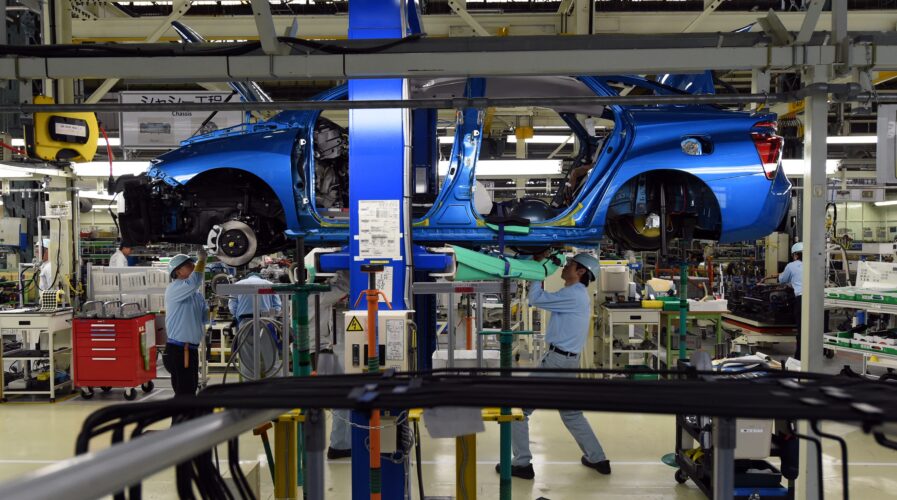
Cyberattack on supplier forces Toyota to halt domestic factory operations. AFP PHOTO / TOSHIFUMI KITAMURA (Photo by Toshifumi KITAMURA / AFP)
Toyota halts domestic factory operations after cyberattack
- The attack comes just after Japan joined Western allies in clamping down on Russia after it invaded Ukraine, although it is unclear if the attack was at all related.
- Toyota has a goal of selling 3.5 million BEVs annually
- The “supplier system failure”, impacting its factory operations, came a few hours after Toyota unveiled its first EV with a safer and longer-lasting battery by 2030 through an 8 trillion yen (US$70 billion) investment to electrify its vehicles.
Two days ago, Japan announced that it is joining the United States (US) and other Western countries in blocking certain Russian banks’ access to the SWIFT international payment system. The move, according to pundits, may trigger the Russians who could possibly retaliate. Not too long later, Japanese automaker Toyota Motor Co reported on a cyberattack hitting its supplier’s system, forcing it to shut factory operations nationwide.
The world’s largest carmaker Toyota announced that it will shut down all of its plants across Japan and the factories of two subsidiaries Hino and Daihatsu following a suspected cyber attack on one of the carmaker’s largest parts suppliers. The nature of the attack however were not revealed nor the source of the attack.
Just last week, Japan’s ministry of economy, trade and industry said in a statement that “Given the current situation, the potential risk of cyber attacks is increasing.” In total, Toyota had halted production at all 14 domestic plants. Overall, the company employs more than 70,000 workers in Japan alone.
The company operates 28 assembly lines in total in the entire Japan. According to reports, Hino too would pause production today. The target of the attack, which Toyota said is due to a “supplier system failure”, was later identified as the general component maker Kojima Press Industries.
Japanese media, without citing sources, said the attack on Kojima appeared to have affected Toyota’s system for making and receiving orders for parts. “Toyota said the shutdown followed “system failures at a domestic supplier”, which it later identified as the general component maker Kojima Press Industries, the Financial Times stated. In terms of impact, Toyota reckon shutting down all domestic plants for one day would reduce production by 13,000 vehicles.
The automaker is currently investigating whether it can resume operations on Wednesday. As of reporting time, Kojima Press Industries’ website seems to be inaccessible. The company confirmed today that its server was subject to a suspected ransomware attack over the weekend. The manufacturer of metal, plastic, and electronic components shut down its server Sunday after discovering it was infected with a virus and receiving threatening messages, Bloomberg noted.
“The closely held parts maker is in contact with relevant police and government authorities and is trying to restore its system from March 2, ” a spokesperson for the company said late Monday. Separately, according to the AP, Kojima spokesman Tomohiro Takayama said “This has never happened before. We are not sure yet if it is a cyberattack, but we suspect it might be one.”
Japanese Prime Minister Fumio Kishida said the government was investigating the attack to determine whether or not Russia was involved. “It is difficult to say whether this has anything to do with Russia before making thorough checks,” he told reporters according to Reuters.
Amidst the havoc this week, Toyota also managed to unveil its first electric vehicle (EV)–bZ4X sport utility vehicle (SUV). The company, a rather late-comer to the battery electric vehicle (BEV) market, is doing all it takes to ensure its first mass-market model is safer and lasts longer than rivals’ products when it goes on sale later this year.
In a report by Reuters, project manager at Toyota, Masaya Yamamoto said “We focused on balancing three factors: cruising range, battery degradation and charging speed.” BEVs usually take hours to charge, and because it uses quick-charging methods that cause the battery’s cells to heat up, the batteries would degrade. That, in turn, reduces cruising range over time, hurting a vehicle’s resale value.
Developed with Panasonic Corp, Toyota said its batteries contain a special coolant that does not conduct electricity easily. Battery packs are also structured to keep the cells and coolant separated in case of a leak. Toyota claims this and other innovations mean the new BEV series’ batteries would retain more than 90% of their capacity after a decade.
Toyota is even considering offering its EVs in Japan through “subscription” – their effort to address worries over battery life and resale value. The subscription fee would cover the cost of maintenance and battery replacement among other features.
Toyota will begin selling the SUV model in Japan and other major markets mid this year. The goal is to sell 3.5 million BEVs annually by 2030 through an 8 trillion yen (US$70 billion) investment to electrify its vehicles.
Note: Shortly after this article were Published, Bloomberg reported that Toyota will resume operations Wednesday after a one-day halt.
READ MORE
- Ethical AI: The renewed importance of safeguarding data and customer privacy in Generative AI applications
- How Japan balances AI-driven opportunities with cybersecurity needs
- Deploying SASE: Benchmarking your approach
- Insurance everywhere all at once: the digital transformation of the APAC insurance industry
- Google parent Alphabet eyes HubSpot: A potential acquisition shaping the future of CRM


